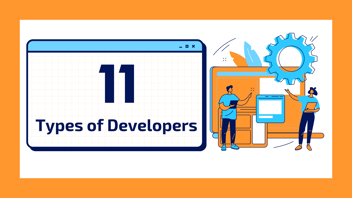What Are the Top Differences Between Junior and Senior Developers?

Hiring developers for your company or startup can be an important step in building your tech team and business. However, there are many types of developers out there. From web developers to app developers to embedded developers. From juniors to mid-level to senior developers.
There are also sub-categories within the same domain. For example, if you’re hiring web developers, there are frontend, backend, and full-stack developers. Each with different seniority roles.
Let’s just say, hiring a developer is a big undertaking. Especially, if you don’t know where to start or who to hire first.
With over 24 million active developers worldwide, there’s a wide range of candidates and opportunities for businesses.
The US Bureau of Labor Statistics (BLS) expects software developer jobs to increase by 21% between 2018 and 2028. That’s compared to only 5% for other occupations. The median for software developer job growth increased to 25% between 2022 and 2032, according to new BLS data.
In this article, we’ll be looking at the hierarchy of developer roles and the differences between junior and senior developers. We’ll also be answering top questions like ‘when do I hire a junior developer?’
The hierarchy of hiring developers: Junior vs mid-level vs senior developers
When you’re considering hiring developers, whether remote, hybrid, or in-house, you need to consider the hierarchy within your team.
A large tech team will have several of these roles collaborating with each other:
- Interns
- Junior developers
- Mid-level developers
- Senior developers
- Tech team lead
Now, let’s dive into each role and the responsibilities shared among developers.
Developer interns
Interns can be undergrads or fresh grads. They may also be people switching careers and want to get hands-on technical experience in your company.
Some interns may have completed internships in other companies during their course of study and may have limited work experience.
In addition, some interns seek internships to complete college coursework or to prepare for the job market.
Developer interns usually have a basic understanding of programming and an idea about the theories of development but no technical experience. They want to see and apply the theories they’ve studied in a real work environment.
For companies, interns offer an opportunity to seed potential talent so the company may consider hiring them when they graduate.
.jpg?width=481&height=481&name=4(1).jpg)
Junior developers
These are developers with 0 to 2 years of experience. They can be fresh out of college and may have completed some computer science courses.
They are now ready to explore and start their careers as web or mobile app developers. Unlike interns, junior developers are considered active contributors to the company and its projects.
Most companies hire junior developers on a full-time basis.
Mid-level developers
These are developers who have passed the junior stage, but are not quite there yet to become senior developers.
Their technical and soft skills have improved. They’re more familiar with their job now and don’t necessarily have to be handed tasks. They can also propose solutions.
Mid-level developers usually have between 2 and 4 years of work experience. This could be in the same company or in different companies.
In terms of soft skills, juniors and mid-level developers share the same soft skills with minor variations.
Developers at the beginning of their career and in mid-level roles should
- have problem-solving skills
- be able to think critically
- be able to work within a team (be a team player)
- have written and verbal communication skills
For mid-level developers, some companies may focus more on communication skills. In this case, seniors and team leads expect mid-level developers to communicate and explain ideas and processes clearly. Sometimes, to non-technical people.
Senior developers
At this stage, developer roles and responsibilities evolve. Whether you are hiring a senior developer or promoting one, there are a few things to consider.
Senior developers usually have over 4 years of professional working experience. The reason companies hire senior developers is because they can work autonomously or without guidance. As opposed to interns and juniors.
In some companies, seniors are tasked with coaching or mentoring newcomers and junior developers. They may also act as a tech team lead or perform some higher-level duties.
Accordingly, senior developers must have strong people skills and be great collaborators. They should also have strong communication skills to convey clear messages and documentation to CEOs and non-tech managers.

Junior vs senior developers: Differences and overlaps
As you can see, there’s an overlap between the technical skills a junior and senior developer can have.
Programming languages, critical thinking, and communication skills - with varying degrees - are requirements for junior and senior developers.
So, what can a senior developer do that a junior cannot?
A junior developer gets a well-defined task to perform. On the other hand, a senior developer gets a problem and is asked to solve it. Their tasks are broad and not well-defined.
A senior developer can work autonomously, whereas a junior cannot.
Tech team lead
To lead your tech team, you can promote one of your senior developers or hire from outside your company.
Some companies may have a senior developer act as a team lead until they promote them or decide to expand the tech team and hire an external lead.
Your tech lead should have at least 5 years of experience.
A tech lead’s responsibilities involve tech skills and knowledge, people management, as well as administrative skills. Your tech team lead should be able to mentor juniors, guide seniors, and manage the tech team technically and professionally.
If part of your recruitment process is to onboard newcomers, your tech lead will be responsible for virtually onboarding new team members.
Unlike other roles, even senior developer roles, the tech team lead needs to
- Resolve conflicts (internal or external that affect their team)
- Have persuasive skills (when delivering reports and presentations to higher-ups and when enticing candidates to join the company)
- Have people skills (to manage their team, including various seniority levels, and during recruitment interviews)
- Collaborative skills (because they will collaborate with other teams and departments within the company)
Who to hire and when?
Many may think they should start their tech hiring process by recruiting junior developers. Especially when starting out with a limited budget.
However, this is not the way to start.
So, when should you hire junior developers?
This is an important question for managers and business owners to ask before making the first hire in their tech team.
Put simply, companies or startups, just starting out often have limited budgets. But you can’t start your tech team by hiring a junior developer. Or even a team of juniors.
In addition, you can’t hire your first junior developer to support the only senior member in your team.
In this case, the junior will be an extra load on your single senior developer.
What about building a tech team?
To be brief, building your tech team means you need to start with senior developers and a tech lead before you can hire juniors.
Your skilled senior developers are the ones who will work on your core project.
Once your team is big enough and you are ready to scale, you can hire a combination of juniors, interns, mid-level, and other senior developers.
.jpg?width=386&height=386&name=3(1).jpg)
With a growing tech team, your seniors can delegate work to the interns and juniors so they can focus on advanced requirements.
If you’re a tech CEO or CTO, you can manage the senior developers yourself for some time before hiring a tech lead. However, if you’re a CEO with no tech background, you’ll need a tech lead ASAP to manage your tech team for you.
Wrapping it up
Whether you’re hiring junior or senior developers, it’s important you’re actively working to overcome tech hiring challenges in your company.
These challenges range from recruitment bias to CV overload on recruitment platforms to offering weak benefits to new candidates.
Understanding that there are differences between technical recruitment and general talent recruitment is an important first step.
Offering a positive candidate experience along with hybrid and remote work options can help you attract tech talents from a wider geographical range. It can also help you retain those techies.
Want to build a tech team? Looking for skilled junior, mid-level, and senior developers but can’t find talents that fit your needs?
Get in touch with TechieMatter and we’ll help you find junior and senior developers that fit your needs and company culture.


.jpg?width=352&name=frontend%20vs%20backend%20vs%20fullstack%20(2).jpg)